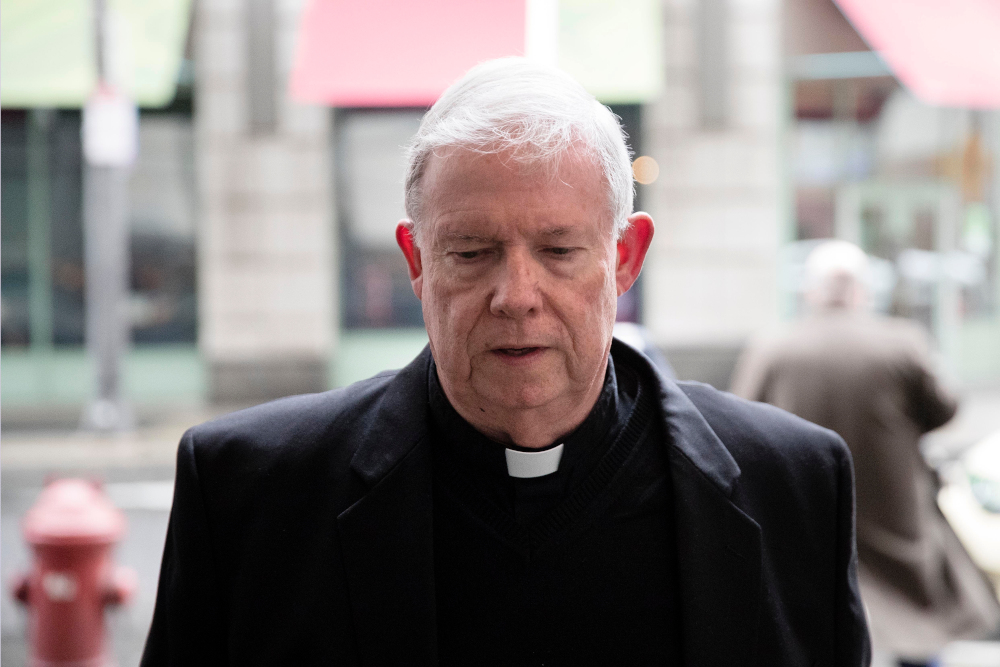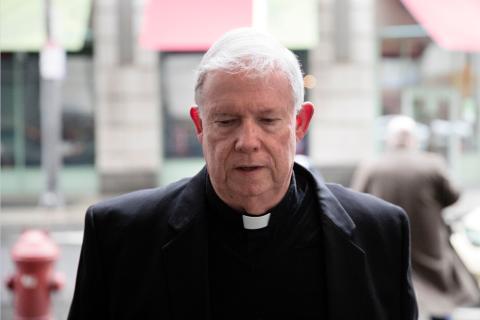
In this March 28, 2017, file photo, Monsignor William Lynn arrives for a preliminary hearing in his retrial of his child endangerment case at the Center for Criminal Justice, in Philadelphia. Lynn is the first Roman Catholic church official ever charged with child endangerment over his handling of priest-abuse complaints. His 2012 conviction has twice been overturned, and his retrial is now set for March 16, 2020. (AP/Matt Rourke, File)

In this March 28, 2017, file photo, Monsignor William Lynn arrives for a preliminary hearing in his retrial of his child endangerment case at the Center for Criminal Justice, in Philadelphia. Lynn is the first Roman Catholic church official ever charged with child endangerment over his handling of priest-abuse complaints. His 2012 conviction has twice been overturned, and his retrial is now set for March 16, 2020. (AP/Matt Rourke, File)
An aging monsignor who was the first U.S. church official ever tried and sent to prison over his handling of priest-abuse complaints could soon be retried in the 2011 case with one thing missing — the victim.
The only accuser whose complaint fell within the statute of limitations is a young man with a history of drug addiction who gave a sordid and unusual account of abuse: he said he was sexually assaulted by two priests and his sixth-grade teacher in the late 1990s. His credibility has long been questioned, even by a retired police detective working for Philadelphia prosecutors.
They have not committed to calling the chief accuser at the March 16 retrial of Monsignor William Lynn, the longtime secretary for clergy at the Roman Catholic Archdiocese of Philadelphia. Lynn was convicted in 2012 of felony child endangerment, but the conviction has twice been overturned.
Common Pleas Judge Gwendolyn Bright, in a ruling Friday, said prosecutors don’t have to tell the defense if they’ll call the accuser, a policeman’s son dubbed “Billy Doe” in court records.
That means Lynn, now 69, could be retried in a case without a known sex-abuse victim. He served 33 months of a three- to six-year prison term before winning a new trial and being released on bail.
The defense says without the accuser, there is no case. But prosecutors say any child put in harms was a potential victim.
“How do you supervise the welfare of a child without knowing who the child is?” defense lawyer Thomas Bergstrom argued at a pretrial hearing this month. “I would like to know today who the victim is.”
Prosecutors argue that Lynn put children’s lives at risk simply by transferring predator priests to new parishes without warning.
“The crime is the exposure to danger,” Assistant District Attorney Patrick Blessington argued in court. “The bomb doesn’t have to go off.”
The judge, in Friday’s ruling, did order prosecutors to subpoena Doe for the trial. Blessington has said that Doe will be on the witness list, but wouldn't promise he would call him. He said the endangerment charge includes not just Doe, but unnamed other children.
The issue of finding a suitable victim whose case falls within the statute has complicated the prosecution of church abuse cases for years.
In 2005, Philadelphia District Attorney Lynn Abraham issued a scathing grand jury report that detailed allegations against 63 credibly accused priests, before concluding that none could be charged under the existing laws.
As the church-abuse scandal simmered across the country, her successor tried a new and ambitious tack. Then-District Attorney Seth Williams, relying on Doe’s account, arrested Lynn in 2011, along with the two priests and teacher that Doe accused.
Ex-priest Edward Avery, labeled a “known predator” by Lynn, pleaded guilty before trial and testified against Lynn — but denied ever molesting Doe. The other priest died in prison in 2014 insisting on his innocence, and the teacher's conviction was overturned based in part on a 2017 memo from the D.A.'s investigator, retired Detective Joseph Walsh.
Walsh, in a 12-page memo he sent to the defense, said he could never corroborate Doe’s account. He said he had pointed out a number of serious inconsistencies to prosecutors before Lynn’s trial, only to be told by one he was "killing (her) case.”
The teacher, Bernard Shero, pleaded no contest to reduced charges in 2017 and was released on time served.
Bright has issued a gag order in the case, and neither Blessington nor Bergstrom returned calls seeking comment on Friday’s ruling.
Advertisement







